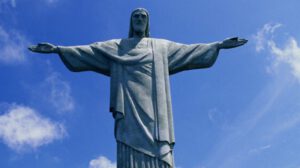Today is the culmination of the liturgical year, a special day to reaffirm our faith and trust in Our Lord Jesus Christ as the King of the Universe. This Solemnity, which, according to the older liturgical calendar, used to be observed on the last Sunday of the month of October, preceding the Feast of All Saints, is now held on the Sunday immediately prior to the first Sunday of Advent.
The day’s readings are a clear endorsement of the Kingship of Our Lord. In the background to the First Reading (2 Sam 5: 1-3) lies the story of Saul, the first king of Israel, who lost to the Philistines, an enemy tribe. Given his ineptitude, God guided the Prophet Samuel to David, a humble but talented musician, who was secretly anointed king. While Saul was still living, David settled in Hebron where he was accepted by the tribe of the southern kingdom of Judah and reigned as their king for seven years.
After Saul died, the northern tribes who had been under Saul came to David at Hebron and anointed him King of all of Israel. Hebron, a Palestinian city thirty kilometres from Bethlehem, is one of the oldest cities in the Levant (a geographical area comprising Lebanon, Jordan, Palestine, Israel and Syria) and now in the focus of the Israeli-Palestinian conflict.
David reigned for forty years, from his capital Jerusalem, until he died at 70 years of age. He had already chosen his son Solomon for his successor, after whose death Israel was no longer a united kingdom. As for David, he is still honoured as an ideal king and the earthly forefather of our Lord and Saviour Jesus Christ, who by His Cross willed to unite all the peoples of the world.

Equally apt for the great Feast of the Kingship of Christ is that passage of St. Paul’s Epistle (Col. 1: 11-20) that reminds us Christians that God has “qualified us to share in the inheritance of the saints in light” and “transferred us to the kingdom of His beloved Son, in whom we have redemption, the forgiveness of our sins.” Jesus is the Alpha and the Omega, through whom and for whom all things were created, “whether thrones or dominions or principalities or authorities”. Jesus made peace “by the blood of his cross”, and “in Him all things hold together.”
The Gospel text (Lk 23: 35-43) points to the striking contrast between Our Lord’s Passion and His final Victory. He died not because he deserved to die; He chose to die as a sacrificial lamb for our salvation. Not realising this, the soldiers mocked at him, saying, “If you are the King of the Jews, save yourself!” Jesus had clarified that His kingdom was not of this earth; and although the inscription ‘Iesus Nazarenus Rex Iudaeorum’ (‘Jesus of Nazareth, King of the Jews’) was meant to be ironic, it went down in history as the real truth. It reflected the conviction that Jesus was indeed the Messiah that they were waiting for – although this school of thought was anathema to the establishment.
There is no doubt, however, that both Jewish tradition and public opinion had unwittingly endorsed the true and complete kingly identity of Jesus. But what did He mean by ‘Kingdom’, as in the remarkable words ‘Thy Kingdom come’ from the Lord’s Prayer? In his book Jesus of Nazareth, Pope Emeritus Benedict XVI writes: “The Kingdom is not a thing, it is not a geographical dominion like worldly kingdoms. It is a person; it is He.”
The Lord’s Kingdom is indeed a spiritual kingdom that has the minds and hearts of the whole of humankind for its domain; but this mystical dimension has its consequence in civil society too. In fact, it is here that we Christians must practise the Beatitudes to the fullest extent, and proclaim the Gospel to the ends of the world, ensuring that our earthly journey becomes a fulfilment of God’s will – the will of His Son, Jesus Christ, King and Lord of the Universe.
A beautiful reflection on today’s feast day of Christ The King
A few days ago Fr. Aaron Magalhaes, one of the most Spirit-filled priests I’ve heard, preached about the kingdom of God, at Cruz dos Milagres’ Friday service. He said the kingdom is within, and is best expressed by our responses, particularly when we hear harsh words. Loved the scripture on”saints in the light”
The Jews mocked at our crucified Lord saying that if He was the Son of God ,He should come down from the cross. In fact, He did more than they demanded in their revilings. As St. Augustine said, “It is greater to rise from the tomb than to come down from the cross.”
May Christ reign in every heart.
Thank you Senhor Oscar.